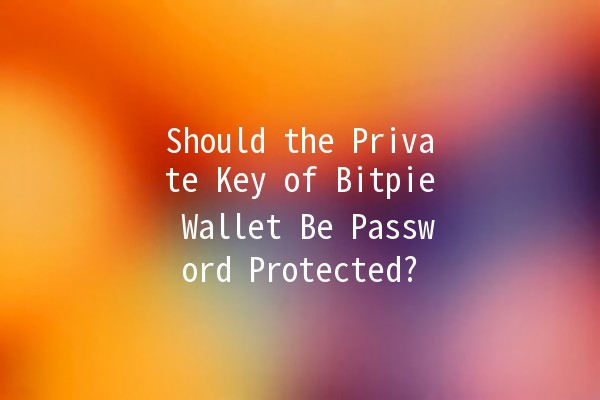
In the rapidly evolving world of cryptocurrency, one of the most critical aspects that users must manage is the security of their digital assets. Among the various tools available for storing cryptocurrencies, wallets play a pivotal role. Among them, Bitpie Wallet stands out for its userfriendly interface and robust features. However, a pressing question has emerged among users: should the private key of Bitpie Wallet be protected by a password?
In this article, we will explore this query in depth, discussing the significance of the private key, the importance of password protection, and various productivityenhancing techniques that users can employ to bolster their security when using the Bitpie Wallet.
Understanding Private Keys
Before delving into password protection, it is essential to comprehend the role of private keys in cryptocurrency. A private key is a unique string of alphanumeric characters that serves as a secure digital signature, enabling users to access and manage their cryptocurrency assets. Think of it as a password for your bank account; if someone obtains your private key, they can control your funds without any safeguards.
The Risks of Not Protecting Your Private Key
Using the Bitpie Wallet, or any digital wallet, involves certain risks. These include:

By implementing password protection on your private key, you significantly reduce these risks.
Should You Use Password Protection for Your Bitpie Wallet Private Key?
Many users wonder if it is necessary to password protect their private keys. The answer is a resounding yes! Here are several compelling reasons:
Password protection acts as an additional layer of defense against unauthorized access. Even if someone obtains your private key, they would still require your password to access your assets.
Knowing that your private key is protected provides peace of mind, especially in an increasingly digital world where cyber threats are prevalent.
In the unfortunate event that you forget your password, having security questions or recovery methods in place can help you regain access.
By adopting password protection, you create a habit of prioritizing security in all crypto dealings, which is essential in today’s landscape.
Many thirdparty security applications are designed to work in synergy with password protection, allowing you to further strengthen your security posture.
Practical Tips for Password Protecting Your Private Key
Now that we understand why password protection is crucial let’s delve into specific tips and techniques to enhance security while using the Bitpie Wallet.
Tip 1: Use Strong and Unique Passwords
Description: Always create strong, unique passwords for your accounts.
Example: Use a mix of uppercase letters, lowercase letters, numbers, and special characters. A password like `S3cuReP@ss!2023` is much stronger than `password123`.
Tip 2: Implement TwoFactor Authentication (2FA)
Description: Twofactor authentication adds another layer of security beyond just the password.
Example: Enable 2FA on your Bitpie wallet if available; this usually involves a code sent to your mobile device, which must be entered along with your password.
Tip 3: Back Up Your Private Key Securely
Description: Create backups of your private key in a secure manner.
Example: Write it down and store it in a safe place, or use encrypted digital files that are stored offline.
Tip 4: Regularly Change Your Passwords
Description: Change your passwords periodically to mitigate the risk of unauthorized access.
Example: Set a reminder to update your password every three to six months.
Tip 5: Educate Yourself on Phishing Attacks
Description: Stay informed about phishing attacks as they target users to steal private information.
Example: Always check the URL and ensure it is the legitimate Bitpie website before entering any personal information.
Addressing Common Concerns
As we further explore the need for password protection of Bitpie Wallet private keys, let's tackle some common questions:
If you forget your password, recovery options, such as security questions or alternative authentication methods, are vital. Ensure you set such options during the initial wallet setup.
While many thirdparty tools enhance security, choose reputable applications with strong user reviews and proven track records. Always read the permissions they require before installing.
Use a password manager to generate and store complex passwords securely. This way, you won't have to remember complicated passcodes.
Although Bitpie has inbuilt security features, relying solely on them is risky. Password protection is essential to safeguard your assets against potential threats.
Estimate changing your password every three to six months or sooner if you suspect any security breach. Keeping passwords fresh reduces risks significantly.
Yes, if someone has your private key without any password protection in place, they have full access to your funds. Hence, safeguarding it with a password is critical.
al Thoughts on Secure Practices
, the practice of password protecting your Bitpie Wallet private key is more than just a good idea; it's a necessary step in safeguarding your cryptocurrencies. The digital asset landscape is fraught with risks, and adopting a proactive approach to security through password protection can save you from potential losses.
Moreover, combining password protection with other best practices such as using strong passwords, enabling twofactor authentication, and staying informed about security threats is crucial. As the digital world continues to grow, especially concerning cryptocurrencies, ensuring that you are equipped with the right knowledge and tools will empower you to navigate it securely.
Embrace these practices today to enhance your cryptocurrency security, and you can enjoy peace of mind knowing your assets are wellprotected!

